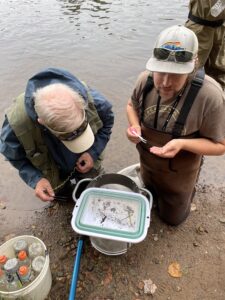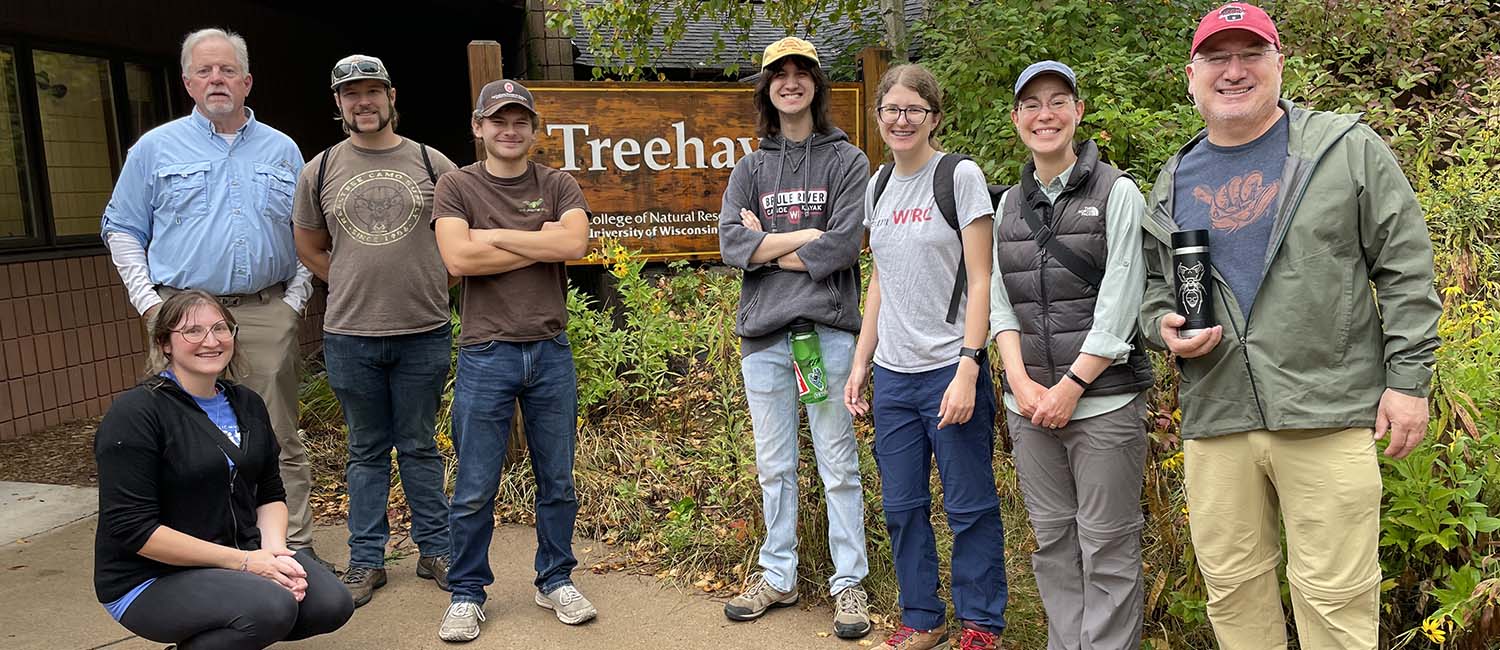BenthicNet: How an Aquatic Insect Project Is Revitalizing Biomonitoring in Wisconsin
Andrew Malacara raves about “Bug Camp,” the informal name for training workshops that are part of a new project funded by the Freshwater Collaborative of Wisconsin.
Malacara is one of six students from UW-Parkside, UW-Stevens Point and UW-Madison who are participating in BenthicNet. The training program includes experts from the three universities as well as the Milwaukee Public Museum. They aim to expand access to collections of insects and other invertebrates that are used for biomonitoring.
Biomonitoring is the practice of analyzing changes in the numbers and types of benthic macroinvertebrates to assess water health/quality. Biomonitoring tools first developed in Wisconsin are now used globally.
Each of the institutions involved has a reference collection of benthic specimens gathered over decades. The collections hold a wealth of historical knowledge that most people, even researchers, aren’t aware exists.
Increasing Accessibility to Valuable Resources Jessica Orlofske, an associate professor at UW-Parkside, envisioned BenthicNet to make the collections more accessible and to train students in collection and preservation techniques. Over the next year, students and faculty will create an online digital database that includes all the collections. The long-term goal is a resource that allows anyone in the state or the world to access the data. The database will be particularly useful for the Wisconsin Department of Natural Resources and for community science participants.
Jessica Orlofske, an associate professor at UW-Parkside, envisioned BenthicNet to make the collections more accessible and to train students in collection and preservation techniques. Over the next year, students and faculty will create an online digital database that includes all the collections. The long-term goal is a resource that allows anyone in the state or the world to access the data. The database will be particularly useful for the Wisconsin Department of Natural Resources and for community science participants.
“Regulatory agencies, such as the WDNR, can use the information to designate certain rivers for particular management practices and to prioritize their water quality sampling,” says Orlofske, who leads the project. “We are making the data they collect more informative and accessible, so they can answer questions about long-term trends.”
In addition to digitizing existing collections, students are learning how to collect and preserve new specimens. Throughout the academic year, students will participate in four hands-on weekend training workshops. The first took place at Treehaven, a public nonprofit field station operated by UW-Stevens Point. Additional workshops will take place on the UW-Madison and UW-Stevens Point campuses and at the Milwaukee Public Museum.
Finding Community One Bug at a Time
For Malacara, the experience thus far has been wildly fun and extremely beneficial to his career goals. He is majoring in applied mathematics and general biology and has a keen interest in entomology, the study of bugs.
His goal for the first workshop was to find a stonefly, an aquatic insect not well represented in the current specimen collections. He and Cole Kupsch, a UW-Madison student, found the first of many while surveying the Wisconsin River.
“We were a distance away from everyone, but I screamed at the top of my lungs, ‘We found a stonefly,’ unable to hold my excitement,” Malacara says. He adds that the best part of working with the other campuses has been finding people who share similar interests and passion.
Skylar Johnston, a graduate student from UW-Parkside, agrees. She is interested in museum work and joined BenthicNet to expand her understanding of collecting, identifying and processing aquatic specimens. Connecting with others who share her enthusiasm has been a huge plus.
“I have loved watching everyone become thrilled when they find certain macroinvertebrates in their samples. It was doubly exciting for me to hear everyone else just as excited as I was to find someone new or big in their nets — and even better getting to see the bugs they found,” she says. “I learned so much in just one weekend!”
Training a New Generation Seeing such enthusiasm about entomology brings Orlofske tremendous joy. She notes that although Wisconsin was once the leader in biomonitoring, many laboratory specialists are nearing retirement age. By training a new generation, Orlofske hopes to contribute to a resurgence of expertise in Wisconsin — and for experts in other parts of the country to once again see Wisconsin as a leader in this type of water quality research.
Seeing such enthusiasm about entomology brings Orlofske tremendous joy. She notes that although Wisconsin was once the leader in biomonitoring, many laboratory specialists are nearing retirement age. By training a new generation, Orlofske hopes to contribute to a resurgence of expertise in Wisconsin — and for experts in other parts of the country to once again see Wisconsin as a leader in this type of water quality research.
“Bugs are a gateway to studying other aspects of freshwater. They can lead to jobs that little kids dream of doing, but students often don’t know these are real jobs,” she says. “This work expands their appreciation of careers that involve water or bugs.”
Student Q&A: BenthicNet
Students from UW-Parkside, UW-Stevens Point and UW-Madison are participating in BenthicNet. The training program includes experts from the three universities as well as the Milwaukee Public Museum. They aim to expand access to collections of insects and other invertebrates that are used for biomonitoring.
Read more about the project in BenthicNet: How an Aquatic Insect Project Is Revitalizing Biomonitoring in Wisconsin
Two of the interns shared their recent experience at the first training weekend at Treehaven in September 2025.
- Skylar Johnston, UW-Parkside, graduate student in studying Biology with a concentration in Ecology, Evolution, and Conservation
- Andrew Malacara, UW-Parkside, undergraduate student with double major in Applied Mathematics and General Biology
Why were you interested in joining this project?
Johnston: I am very interested in museum digitization/curation of specimens and how we can use them for research and outreach. I am also interested in aquatic macroinvertebrates and biomonitoring samples and how we can best use that data in our collections and research.
Malacara: I was interested in this project for a few reasons. Firstly, I had been working under Dr. O. (Jessica Orlofske) as an independent study student for three months and had a great time doing so, making it easy to say yes to a project she was leading. The project itself was a golden opportunity for me. I have an interest in entomology and was looking for any opportunity I could get to learn more about the subject.
What skills have your gained or do you hope to gain?
Johnston: So far, I have expanded my understanding of where to find certain macroinvertebrates in water ecosystems. I would love to keep expanding that so that I am able to understand what macroinvertebrates I can expect to find in those ecosystems and what their presence/absence could tell us from a biomonitoring standpoint. I also want to be able to identify macroinvertebrates to a lower taxa level than I can right now. Being able to identify many of them to genus would be a (very ambitious) dream come true!!
Malacara: We’re still early in the project, but so far, I have worked with a multitude of surveying equipment across various aquatic habitats, learning hands on what works best for which environment. My understanding of the classification of aquatic insects and other aquatic invertebrates has steadily improved since the start of this project. As for things to come, we are having a workshop in Madison where we will learn more about how best to preserve specimens along with proper museum curation.
What has been your favorite or most memorable experience so far?
Johnston: There isn’t one singular moment, but rather the repeated excitement from faculty and students bringing back their sampling gear and finding new or exciting macroinvertebrates. The water systems we sampled on this trip had different macroinvertebrates than the ones in the rivers I regularly sample, so seeing new taxa was so exciting. It was doubly exciting to hear everyone else just as excited as I was to find someone new or big in their nets too (and even better getting to see the bugs they found!).
Malacara: My favorite memory so far is from our first workshop in Treehaven. I had a goal of finding a stonefly, an aquatic insect that we didn’t have many of in our collection. While surveying the Wisconsin River, Cole, a Madison student, and I found one! We were a distance away from everyone, but I screamed at the top of my lungs, “WE FOUND A STONEFLY,” unable to hold my excitement. Little did I know they had already found a few stoneflies, and Coel and I did go on to find around 20 more, but the excitement of that first one will stick with me forever.
What have you enjoyed about working with faculty and students from another university?
Johnston: Every person brings different passions and experiences to this project, and I also think it a project where people are growing new passions. I have loved watching everyone become thrilled when they find certain macroinvertebrates in their sample. I have enjoyed the faculty helping me expand my entomological and water ecosystem knowledge. I have loved being able to sit with faculty who are experts in this field and have the specimens in front of me in the river so they can point out adaptations the macroinvertebrates have to live in these areas and then how they go about identifying them in the lab. I feel like I learned SO MUCH in just one weekend!!!
Malacara: The best part of working with the other campuses is finding people who share an interest and a passion with you, learning more about their favorites, and gabbing about yours. It’s really just nice finding your people!
How do you think this experience help you attain your career goals?
Johnston: A career path I am very interested in is in museum work. I would love to expand my understanding of collecting, identifying, processing, and then connecting other researchers to museum material. This project feels very close to what I would love to see as a larger stronger network across Wisconsin. I would love to be able to use our collections for outreach, research, and display. Aquatic macroinvertebrates are my favorite and I want everyone to see how stunning they are!
Malacara: I think this will be great for my future career. The kind of work we are doing with this project is exactly what I want to be doing with my life. Beyond this, it looks good for a grad school application; the experience is just so much fun that it fuels me to do well in all my academics so I can one day lead projects like this with my own undergrads!